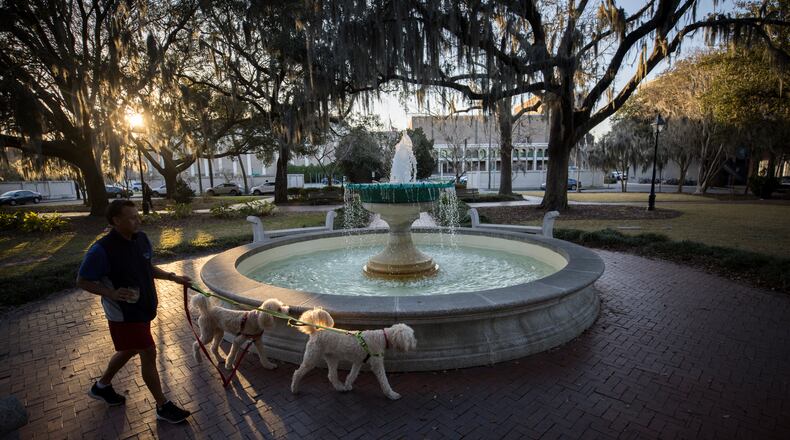SAVANNAH — Demolition crews will take the wrecking ball to the Savannah Civic Center, but not all of the half-century-old municipal complex will be razed.
The Savannah City Council voted 7-1 Thursday to formally adopt a plan to demolish the arena half of the facility but retain and refurbish the Johnny Mercer Theatre, a 2,500-seat performance hall, as well as adjoining ballrooms.
The decision follows a monthslong public engagement process seeking feedback on the future of the civic center, which sits on 7 acres spread over six blocks in the heart of the city’s historic district.
The resolution also reverses a 2019 decision by Savannah’s elected leaders that called for a full razing of the site, the restoration of the historic street grid and square obliterated with the building of the civic center in the late 1960s and early 1970s, and the sale of the city-owned parcels to private owners, returning those properties to the tax rolls.
City staff unveiled the proposal to retain the theater and ballrooms in April 2022. Then in March, shortly after a federal agency removed a warning about the city’s “threatened” historic district that had limited redevelopment options, Mayor Van Johnson told The Atlanta Journal-Constitution of his plans for the public engagement process, saying “it’s time to move forward.”
Credit: Stephen B. Morton for the AJC
Credit: Stephen B. Morton for the AJC
The city held four open houses about the proposals for the civic center property and received nearly 500 public comments.
Thursday’s vote is meant to give City Manager Jay Melder strategic direction on the future of the site. Upon passage of the resolution, the mayor told Melder, “Mr. manager, do not sit on this.” Alderwoman Estella Shabazz, the mayor pro tem, promised those in attendance at the meeting a “beautiful theater.”
Melder’s staff will formulate designs and cost estimates in the next 90 to 120 days. An initial city assessment forecast a net cost of $90 million to $120 million to demolish the arena, restore parts of the site where the arena currently stands and renovate the theater, including replacing the building’s main entrance facade. For comparison, the refurbishment of a similar performance arts hall in Charleston, S.C., the Galliard Center, cost $142 million — in 2012.
Johnson emphasized a sense of urgency in talking about the civic center site’s future. Speaking earlier this week, he said he did not want a repeat of the saga around the development of the Enmarket Arena, a 10,000-seat sports and entertainment venue that opened in 2022 some 20 years after the city began acquiring property for the facility.
“For me, 50 years now, what will they say about us? In 2074, are they saying those folks made the right decision rather than ‘What the hell were they thinking about?’ It’s a weighty decision,” Johnson said. “We are going to pick a road and go down it and move rapidly toward something. We cannot wait 20 more years to figure out what we want to do.”
Credit: Stephen B. Morton for The Atlanta Journal Constitution
Credit: Stephen B. Morton for The Atlanta Journal Constitution
Council considered two other options for the civic center site on Thursday: renovation of the full complex or demolition of the full complex with replacement of the theater and ballrooms at an alternative — and not-yet-identified — location.
The civic center’s arena, named for Martin Luther King, Jr., has gone largely unused since the opening of the Enmarket Arena two years ago a couple miles to the west. A 2022 city assessment classified the older arena as functionally obsolete with millions of dollars in deferred maintenance costs, including a nonfunctioning climate control system and a deteriorating roof.
But demolishing both the MLK Arena and the Mercer Theatre would mean the loss of Savannah’s lone midsized performing arts venue. The Mercer Theatre accommodates shows that need more than the 1,200 seats found in the city’s many intimate theaters and concert halls but less than the minimum capacity at Enmarket Arena, which is configurable for crowds ranging in size from 4,000 to 10,000.
“There are uses of the civic center that are not being replicated at the (new) arena,” Melder said, citing cultural festivals, community expos and concerts requiring a more intimate setting.
Public sentiment toward retaining and renovating the theater has grown steadily in recent years, backed by local arts and music groups and influential elected officials. Johnson championed the proposal despite voting in favor of full demolition in 2019. He acknowledged his change of heart Thursday, saying “you know better, you do better.”
But until recently that Mercer Theatre plan faced a significant obstacle: an assessment from the National Park Service (NPS) that deemed Savannah’s historic integrity “threatened.” The criticism stemmed from a 2018 report in which the NPS chided Savannah leaders for large-scale development that ran contrary to the urban plan and other elements cited in Savannah’s National Historic Landmark District designation.
The presence of the “threatened” label weakened the case for saving the Mercer Theatre. So long as the district’s historic integrity remained “threatened,” Savannah’s leaders lacked the political will to back the raze-the-arena-but-keep-the-theater movement.
The “threatened” stain was wiped away in late 2022 — although not communicated to Savannah officials until almost a year later — by an administrative decision by the NPS to suspend its historic integrity monitoring program nationwide. To minimize Savannah’s chances of landing back on the NPS naughty list, city staffers are preparing an update to its landmark status broadening the definition of what makes the district historic beyond the Oglethorpe Plan.
About the Author
Keep Reading
The Latest
Featured




